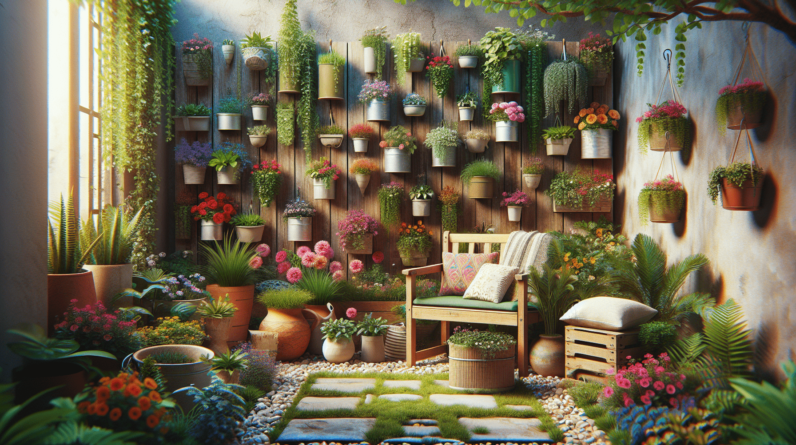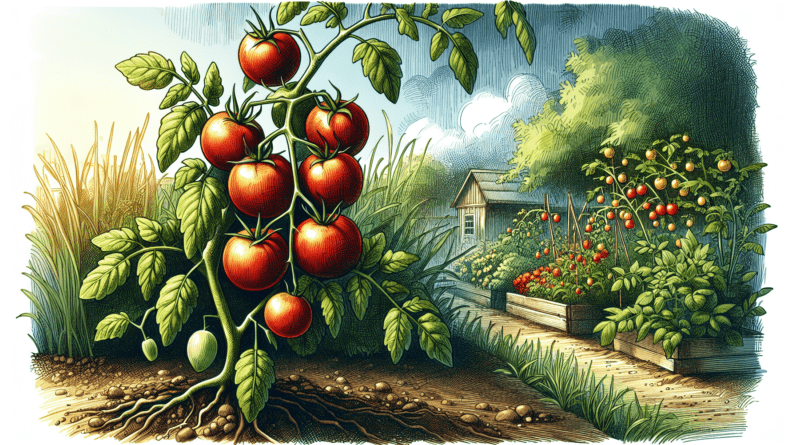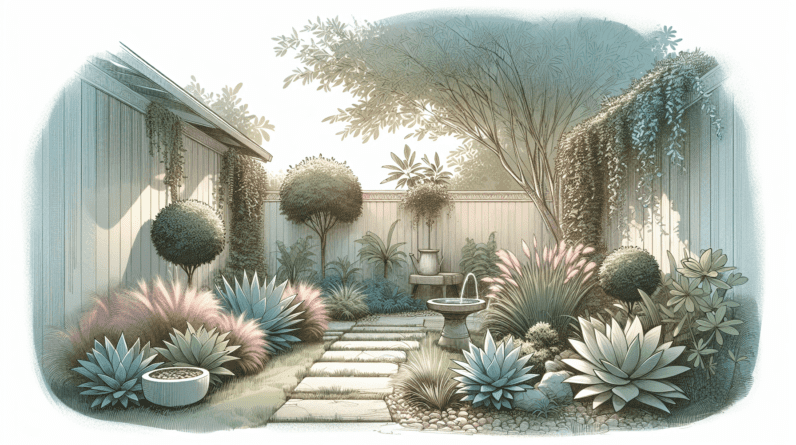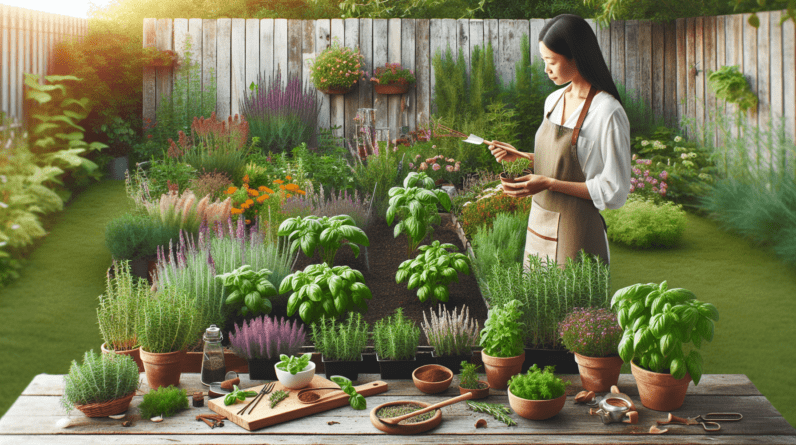
Are you keen on sprucing up your backyard with something both practical and delightful? “Beginner’s Guide to Backyard Herb Gardening” is just the ticket for transforming your outdoor space into a haven of aromatic greens. This article gently guides you through the initial steps of starting your very own herb garden, from selecting the right herbs to understanding the nuances of soil and sunlight. Whether you’re a total novice or simply looking to hone your green thumb, this guide offers straightforward advice to get you growing with confidence and ease. Have you ever looked out at your backyard and thought about how fantastic it would be to step outside and grab some fresh basil or mint for tonight’s dinner? You’re not alone. More and more people are realizing the benefits and joys of herb gardening. Whether you’re a seasoned green thumb or just starting out, this guide is here to walk you through everything you need to know to get your herb garden up and running.
Why Start an Herb Garden?
Herb gardening isn’t just for the seasoned gardener or the culinary expert. It’s for everyone. You may think you need tons of space or special equipment, but that’s far from the truth. Whether you have a sprawling backyard or just a small balcony, you can cultivate a thriving herb garden with the right know-how.
Not only does it provide you with fresh, flavorful ingredients for your meals, but it also connects you to nature. Plus, let’s not forget the money you’ll save by growing your own herbs instead of buying those expensive little plastic packages at the store.
Health Benefits
Growing your own herbs means you know exactly what you’re eating. There’s no need to worry about pesticides or harmful chemicals. Plus, herbs are packed with nutrients and antioxidants that contribute to your health. Whether it’s the digestive benefits of peppermint or the anti-inflammatory properties of thyme, you’ll be doing wonders for your body.
Mental Well-being
Gardening has been shown to reduce stress and improve mental health. The act of tending to your plants, watching them grow, and savoring them in your meals is profoundly satisfying and provides a sense of accomplishment.
Choosing Your Herbs
Before you rush out and buy a bunch of seeds, it’s essential to think about which herbs you actually want to grow. Start with a few that you’ll use the most.
| Herb | Best Use | Sunlight | Water Requirements |
|---|---|---|---|
| Basil | Pesto, salads, Italian dishes | Full Sun | Keep soil consistently moist |
| Mint | Teas, desserts, refreshing drinks | Partial Shade | Moderate, but don’t let the soil dry out |
| Rosemary | Roasts, stews, breads | Full Sun | Drier soil, do not overwater |
| Parsley | Garnishes, salads, sauces | Full to Partial Sun | Keep soil moist |
| Thyme | Soups, stews, marinades | Full Sun | Likes dry conditions, don’t overwater |
Annuals vs. Perennials
You’ll also need to decide whether you want to grow annual herbs, which complete their life cycle in one year, or perennials that come back year after year. Basil is an excellent example of an annual herb, while rosemary is a hardy perennial.
Heirloom vs. Hybrid
These are terms you might come across when buying seeds. Heirloom varieties are plants that have been cultivated and passed down through generations without any modification, while hybrid plants are bred by combining two different species to create a new one. Heirloom herbs often have more robust flavors, whereas hybrids may be more resistant to diseases.
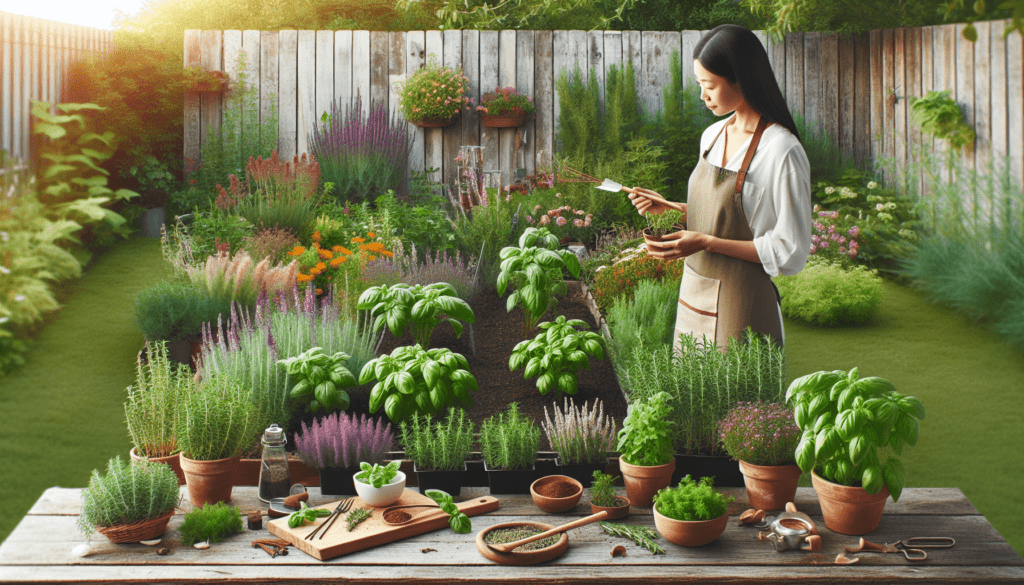
Preparing Your Garden
Got a spot in mind? Great. Let’s get it ready.
Soil Preparation
Good soil is the secret sauce of a thriving herb garden. Most herbs prefer well-draining soil. If the soil in your backyard is heavy clay or sandy, you might need to amend it with organic matter like compost.
Raised Beds vs. Ground Beds
Both have their advantages. Raised beds offer better drainage and can be easier on your back, while ground beds allow for more natural root growth. Here’s a quick comparison to help you decide:
| Aspect | Raised Beds | Ground Beds |
|---|---|---|
| Drainage | Excellent | Depends on soil quality |
| Soil Control | High | Some dependency on existing soil |
| Cost | Higher | Lower |
| Installation Time | Longer | Shorter |
| Maintenance | Easier | Harder on the back |
Containers
If you’re short on space or just want a more manageable way to grow herbs, consider using containers. They offer the flexibility to move your herbs as needed to find optimal growing conditions.
Planting Your Herbs
Now that you have your spot and your soil all set, it’s time to plant!
Seed vs. Seedling
Starting from seeds can be more economical and offer a wider variety of herbs, but it requires more patience and care. Seedlings, on the other hand, give you a head start and are more immediate.
Plant Spacing
Overcrowded plants have to compete for light, water, and nutrients, so always respect the recommended spacing for each herb. For example, basil needs about 12-18 inches of space, while thyme can make do with 6-12 inches.
Watering Schedule
Most herbs prefer their soil to be consistently moist but not waterlogged. A good rule of thumb is to water deeply but infrequently. This encourages the root systems to grow deeper, making your herbs more drought-tolerant.
Mulching
A layer of mulch helps to retain soil moisture, reduce weeds, and keep your garden looking tidy. Organic mulches, like straw or compost, also add nutrients back into the soil.

Caring for Your Herb Garden
It’s not just about planting and then sitting back. Proper care ensures that your herbs will thrive.
Pruning and Harvesting
Regular pruning not only gives you more herbs to use but also encourages your plants to grow fuller and bushier. Try to prune in the morning after the dew has dried but before the day gets too hot.
Fertilizing
Herbs are generally not as demanding as vegetables, but a light feeding every few weeks can be beneficial. Use an organic fertilizer to keep things natural.
Pest Control
Every garden has its pests. The key is early detection. Look for aphids, spider mites, and whiteflies. Neem oil and insecticidal soaps are effective and eco-friendly solutions. Also, companion planting can naturally deter pests—marigolds, for example, can repel a variety of unwanted insects.
Harvesting and Storing Herbs
You’ve put in the hard work, and now it’s time to reap the rewards.
When to Harvest
The best time to harvest most herbs is just before they flower, when their essential oils are at their peak concentration. Generally, harvesting in the morning after the dew has evaporated gives the best flavor.
Drying and Freezing
To keep your herbs long after the growing season is over, consider drying or freezing them.
Drying
Air drying is the easiest method. Harvest herb stems, tie them in small bundles, and hang them upside down in a dry, well-ventilated place. Once dry, strip the leaves from the stems and store them in airtight containers.
Freezing
For herbs like basil, which don’t dry well, freezing is the way to go. Coarsely chop the leaves and place them in ice cube trays topped with water or olive oil. Once frozen, pop the cubes out and store them in zip-top bags.
Making Infusions and Oils
Another fantastic way to use your herbs is by making infusions or herbal oils. Simply place fresh herbs in a jar and cover them with olive oil. Let it steep for a week, strain, and voila! You’ve got a delicious, homemade herb oil ready to use in your cooking.
Troubleshooting Common Problems
Every gardener faces challenges. Don’t get discouraged; it’s part of the learning process.
Yellowing Leaves
Often caused by overwatering or poor drainage. Make sure your soil is well-draining and cut back on the watering.
Leggy Growth
Usually a sign of insufficient light. Make sure your herbs are getting the right amount of sun. If they’re in containers, consider moving them to a sunnier spot.
Lack of Flavor
Herbs that are over-fertilized tend to lose flavor. Stick to a moderate feeding schedule and ensure they’re getting enough light and water.
Year-Round Herb Gardening
Want fresh herbs even in the colder months? Indoor herb gardening is a fantastic alternative.
Choosing the Right Spot
Windowsills that get at least six hours of sunlight per day are ideal. If that’s not possible, grow lights are an excellent investment.
Indoor Herb Varieties
Some herbs are better suited to indoor life. Consider growing:
- Basil: Loves warmth, perfect for sunny windowsills
- Chives: Versatile and easy to grow indoors
- Mint: Can thrive with less sunlight
- Parsley: Low-maintenance and perfect for indoor growing
- Thyme: Compact and resilient
Maintaining Indoor Herbs
Watering is crucial. Indoor herbs dry out faster, so check the soil often. Also, ensure good air circulation to prevent mold and mildew. If you’re using grow lights, set them on a timer to mimic natural daylight.
Getting the Kids Involved
Gardening can be a fantastic family activity. It’s educational, fun, and a great way to teach responsibility.
Kid-Friendly Herbs
Start with easy-to-grow and fragrant herbs like mint or basil. They’re tough, forgiving, and their rapid growth can hold a child’s interest.
Fun Activities
- Herb Chat: Talk about the uses and benefits of each herb you’re planting.
- Taste Tests: Let the kids taste and smell the herbs.
- Craft Projects: Use herbs for making homemade soap or bath salts.
Community and Sharing
Gardening can be a social activity, too. Share your bounty with friends, family, or local community centers. You can even start or join a local garden club to swap tips and tricks.
Sharing the Love
Bag up extra herbs and give them to neighbors. It’s a wonderful way to connect with your community and spread the joy of gardening.
Herbal Gift Ideas
Think beyond just giving away herbs. Make infused oils, homemade soap, or dried herb sachets. They make fantastic, heartfelt gifts.
Final Thoughts
Embarking on the journey of herb gardening is incredibly rewarding. You’ll not only have a constant supply of fresh herbs to elevate your cooking but also the satisfaction of nurturing life and connecting with nature.
Remember, every gardener starts as a beginner. Don’t rush it, enjoy the process, and most importantly, have fun. Happy gardening!
By keeping it simple and following these steps, your herb garden will flourish, and you’ll be well on your way to becoming an herb aficionado in no time. So, grab your trowel, some seeds, and get to planting. Your future self will thank you.


